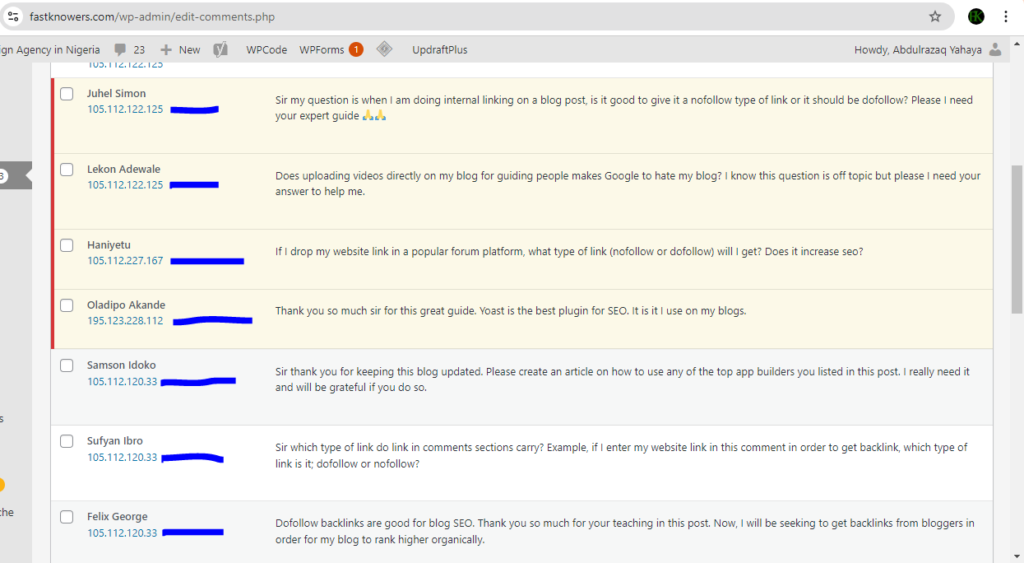Do you want to know how you can use IP addresses? In this article today, I will show you everything about IP addresses and how to use them in website management.
IP addresses serve as unique identifiers for devices and servers on the internet. As a web developer, administrator, and IT professional, it is good to know the uses of IP addresses.
Today, you will know what IP addresses are, their types, and how they can be applied in various aspects of website management, from server configuration and commenting to security. You may see our expert step-by-setp guide on how to add a captcha to your website or blog.
Now, let us get started.

What is an IP Address?
An IP address (Internet Protocol address) is a numerical label assigned to each device connected to a computer network that uses the Internet Protocol for communication. It allows computers, servers, and devices to locate and communicate with each other online.
Types of IP Addresses
- IPv4 (Internet Protocol Version 4):
The most commonly used type of IP address, written in the format of four decimal numbers separated by dots (e.g., 192.168.1.1). It provides around 4.3 billion unique addresses. - IPv6 (Internet Protocol Version 6):
Due to the shortage of IPv4 addresses, IPv6 was introduced. It is a longer, hexadecimal format (e.g., 2001:0db8:85a3:0000:0000:8a2e:0370:7334), that allows a virtual limitless number of IP addresses.
There are public IP addresses and private IP addresses. Public IP addresses are used to identify devices or servers on the internet which are assigned by Internet Service Providers (ISPs). While private IP addresses on the other hand are used for devices within a private network, such as in your home or office.
Uses of IP addresses in website management
1. Assigning IP addresses to servers
Every website on the internet is hosted on a server, and each server has a public IP address. The domain name system (DNS) translates domain names (e.g, fastknowers.com) into IP addresses. Here’s how it works:
- When a user enters a website URL, the browser sends a request to a DNS server to resolve the domain name to its corresponding IP address.
- The request is then forwarded to the server hosting the website using that IP address to allow the website to be displayed in the user’s browser.
In website management, you may need to manually assign a static IP address to your server or ensure that the DNS records are pointing to the correct IP. You may see our guide on how to use Cloudflare for SSL certificate.
2. Managing multiple websites on a single IP address
In shared hosting, multiple websites are hosted on a single server with one IP address. This is made possible through virtual hosting, where each website is associated with a unique domain but shares the same IP address.
You may ask, how does it work, right?
The web server uses host headers to determine which website to serve based on the domain name entered by the user. When a shared hosting company is setting up multiple websites, they understand that they must configure the server to handle requests for each domain separately, even though they are going to share the same IP.
3. Dedicated IP addresses
A dedicated IP address is assigned to only one website or domain. This setup is typically used for:
- SSL certificates: Some types of SSL certificates (such as legacy certificates) require a dedicated IP address to establish a secure connection between the server and the browser.
- Direct server access: With a dedicated IP, you can access your website directly by entering the IP address in a browser instead of the domain name.
- Email deliverability: Websites with dedicated IP addresses are often used for email sending because it reduces the chances of emails being marked as spam (as the IP address is not shared with other websites).
4. DNS management
Managing Domain Name Server (DNS) settings is important in website management. Here’s how IP addresses are involved:
- A Records: The “A” (Address) record maps your domain to your server’s IP address. For example, the A record for
example.commight point to192.168.1.1. - PTR Records (Reverse DNS): This allows reverse DNS lookups where an IP address is resolved into a domain name. PTR records are ensure that email servers are not flagged as spam.
- CNAME Records: While CNAME records don’t map to IP addresses directly, they point one domain name to another domain name, which is ultimately resolved to an IP address.
DNS records ensures that users and search engines can access your website without issues.
5. Blocking users
In website security and management, IP addresses are used to block traffic and users that carry out malicious activities on your website:
- Whitelist/blacklist IPs: You can create rules that allow only specific IP addresses to access your website (whitelisting) or block certain IPs that are known to be involved in malicious activity (blacklisting). You may see our step-by-step guide on how to block visitors from certain locations on your website.
- Firewall configuration: Many websites use firewalls to block unwanted or harmful traffic based on IP addresses. These tools can automatically block IPs that show suspicious behavior, such as multiple failed login attempts or DDOS attacks.
- Geo-blocking: Some websites block traffic from certain countries by identifying IP ranges associated with those regions. This is common in managing access to content restricted by region or avoiding attacks originating from specific areas.
You may see our expert guide on how to add a captcha to your website or blog step-by-step.
6. Commenting system

In blogging, IP addresses are used to manage users’ comments. In the screenshort above, the numbers which we pointed blue lines to are IP addresses of people that have commented on a blog. Since their IP addresses are displaying, you can do anything with it. You can know their location, server internet service provider, etc. You may see our expert guide on how to block visitors from certain locations on your website.
Here’s how IP addresses are used in commenting:
- User identification: When a user submits a comment on a blog or website, their IP address is recorded along with the comment. This helps site administrators track where comments are coming from and identify users, even if they are not logged in.
- Moderation and spam prevention: IP addresses help in filtering spam and inappropriate comments. Websites can block or limit comments from specific IP addresses if they notice malicious activity or spam submissions. Many commenting systems integrate anti-spam tools like Akismet, which analyze IP addresses to detect and block spambots.
- IP banning: If a user repeatedly violates commenting guidelines (they spam the comment section of a blog or website), you can block their IP address in order to prevent them from submitting spammy comments in the future.
If you are using IP addresses properly, you can maintain a healthy commenting system on your blog or website for your users’ security.
How to find your website’s IP address
Method 1. Command Line
To find your website’s IP address, use Command Line (Windows, Mac, Linux), open the terminal or command prompt, type: ping yourdomain.com. Then the IP address of your domain will appear in the output.

2. DNS lookup tools
You can use online DNS lookup tools such as What’s My DNS or MXToolbox to find your website’s IP address by entering your domain name.
If you have a control panel (cPanel), you can easily find and manage your website’s IP address. In cPanel’s DNS Zone Editor, you can see your website’s A records, CNAME records, and PTR records.
Importantly, many hosting providers allow you to assign dedicated IP addresses directly from your control panel.
Expert tips for using IP addresses in managing your website
- Use static IPs for servers to ensure stability as dynamic IPs can change over time which may cause issues with DNS resolution.
- Regularly update your DNS records to ensure that DNS records are correctly pointing to the right IP addresses, especially after you have changed your web hosting provider.
- Monitor IP address blacklists: Regularly check if your website’s IP is blacklisted to avoid email delivery issues and potential security threats.
Conclusion
IP addresses help alot in website management. Hope this article has helped you to understand how to IP addresses website management. You may also see our expert guide on how to check your website’s speed.
If you know that this guide has helped you, you may subscribe to my YouTube channel for more updates. You can also find me on Facebook. Please share your thought with me via the comment box and don’t forget to share this article with others.





Thank you sir very much for breaking this topic step-by-step. My website manager suggested that we should block some IP addresses that seem our attackers are mostly from there.
Okay. Good to hear that your web manager wants to blacklist some IP addresses of your users. Let him do the right things that he wants.